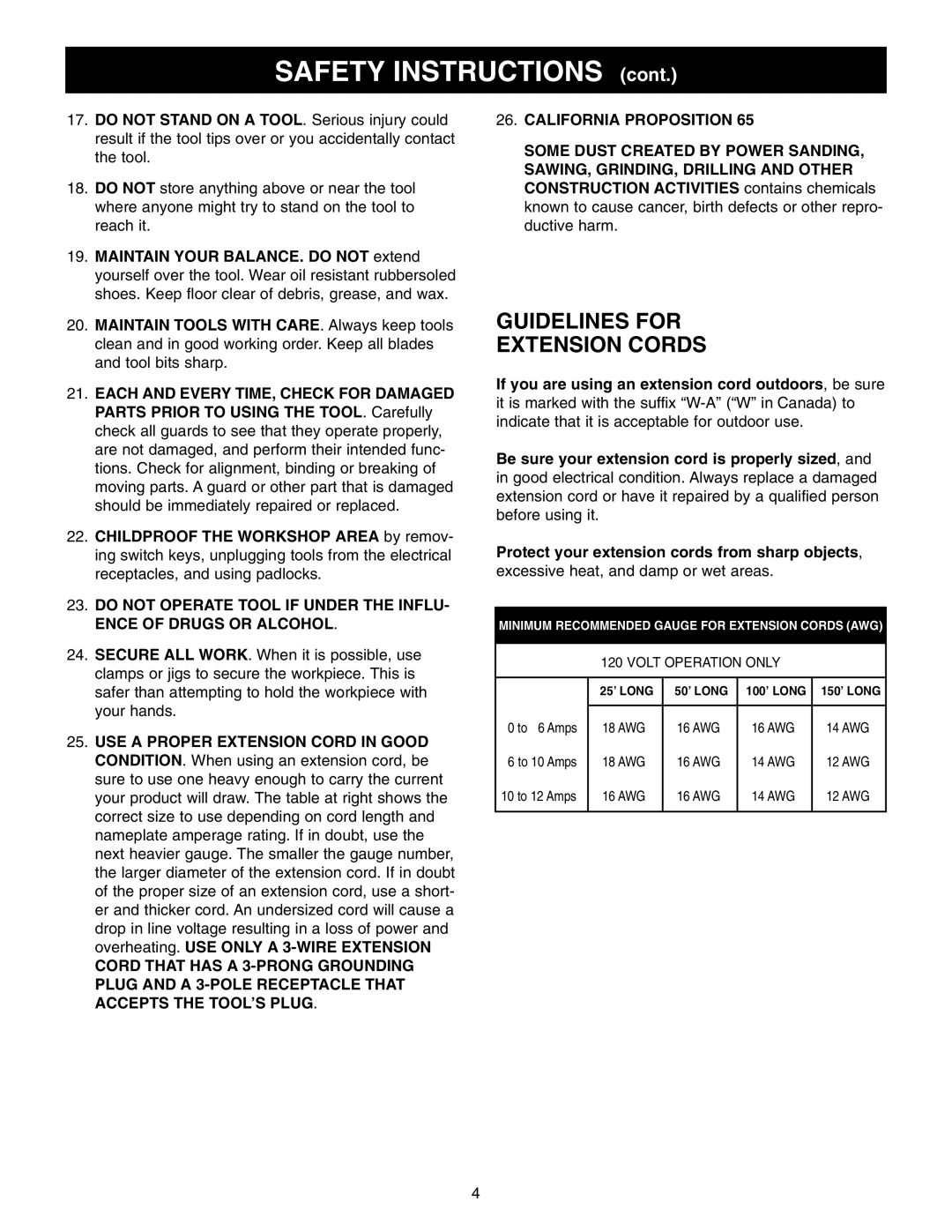
SAFETY INSTRUCTIONS (cont.)
17.DO NOT STAND ON A TOOL. Serious injury could result if the tool tips over or you accidentally contact the tool.
18.DO NOT store anything above or near the tool where anyone might try to stand on the tool to reach it.
19.MAINTAIN YOUR BALANCE. DO NOT extend yourself over the tool. Wear oil resistant rubbersoled shoes. Keep floor clear of debris, grease, and wax.
20.MAINTAIN TOOLS WITH CARE. Always keep tools clean and in good working order. Keep all blades and tool bits sharp.
21.EACH AND EVERY TIME, CHECK FOR DAMAGED PARTS PRIOR TO USING THE TOOL. Carefully check all guards to see that they operate properly, are not damaged, and perform their intended func- tions. Check for alignment, binding or breaking of moving parts. A guard or other part that is damaged should be immediately repaired or replaced.
22.CHILDPROOF THE WORKSHOP AREA by remov- ing switch keys, unplugging tools from the electrical receptacles, and using padlocks.
23.DO NOT OPERATE TOOL IF UNDER THE INFLU- ENCE OF DRUGS OR ALCOHOL.
24.SECURE ALL WORK. When it is possible, use clamps or jigs to secure the workpiece. This is safer than attempting to hold the workpiece with your hands.
25.USE A PROPER EXTENSION CORD IN GOOD CONDITION. When using an extension cord, be sure to use one heavy enough to carry the current your product will draw. The table at right shows the correct size to use depending on cord length and nameplate amperage rating. If in doubt, use the next heavier gauge. The smaller the gauge number, the larger diameter of the extension cord. If in doubt of the proper size of an extension cord, use a short- er and thicker cord. An undersized cord will cause a drop in line voltage resulting in a loss of power and overheating. USE ONLY A
CORD THAT HAS A
26.CALIFORNIA PROPOSITION 65
SOME DUST CREATED BY POWER SANDING, SAWING, GRINDING, DRILLING AND OTHER CONSTRUCTION ACTIVITIES contains chemicals known to cause cancer, birth defects or other repro- ductive harm.
GUIDELINES FOR
EXTENSION CORDS
If you are using an extension cord outdoors, be sure it is marked with the suffix
Be sure your extension cord is properly sized, and in good electrical condition. Always replace a damaged extension cord or have it repaired by a qualified person before using it.
Protect your extension cords from sharp objects,
excessive heat, and damp or wet areas.
MINIMUM RECOMMENDED GAUGE FOR EXTENSION CORDS (AWG)
120 VOLT OPERATION ONLY
|
| 25’ LONG | 50’ LONG | 100’ LONG | 150’ LONG |
|
|
|
|
|
|
0 to | 6 Amps | 18 AWG | 16 AWG | 16 AWG | 14 AWG |
6 to 10 Amps | 18 AWG | 16 AWG | 14 AWG | 12 AWG | |
10 to | 12 Amps | 16 AWG | 16 AWG | 14 AWG | 12 AWG |
|
|
|
|
|
|
4
